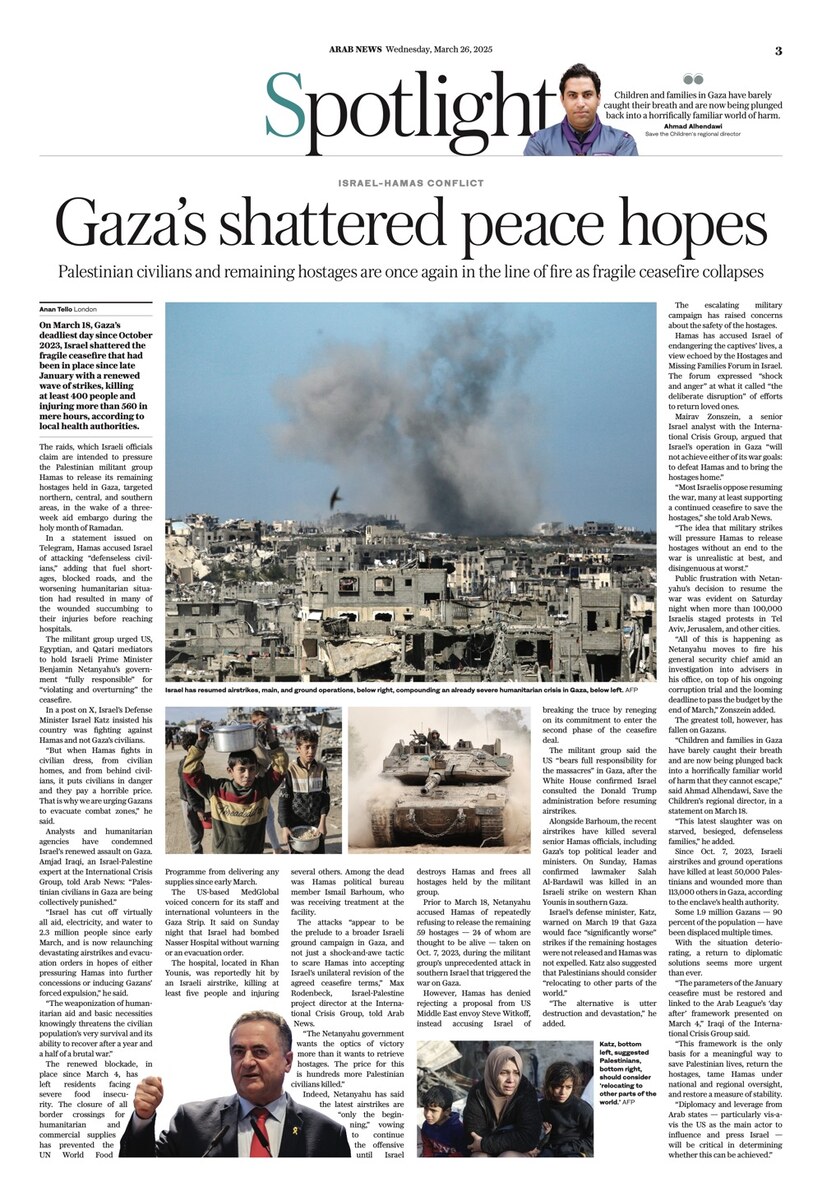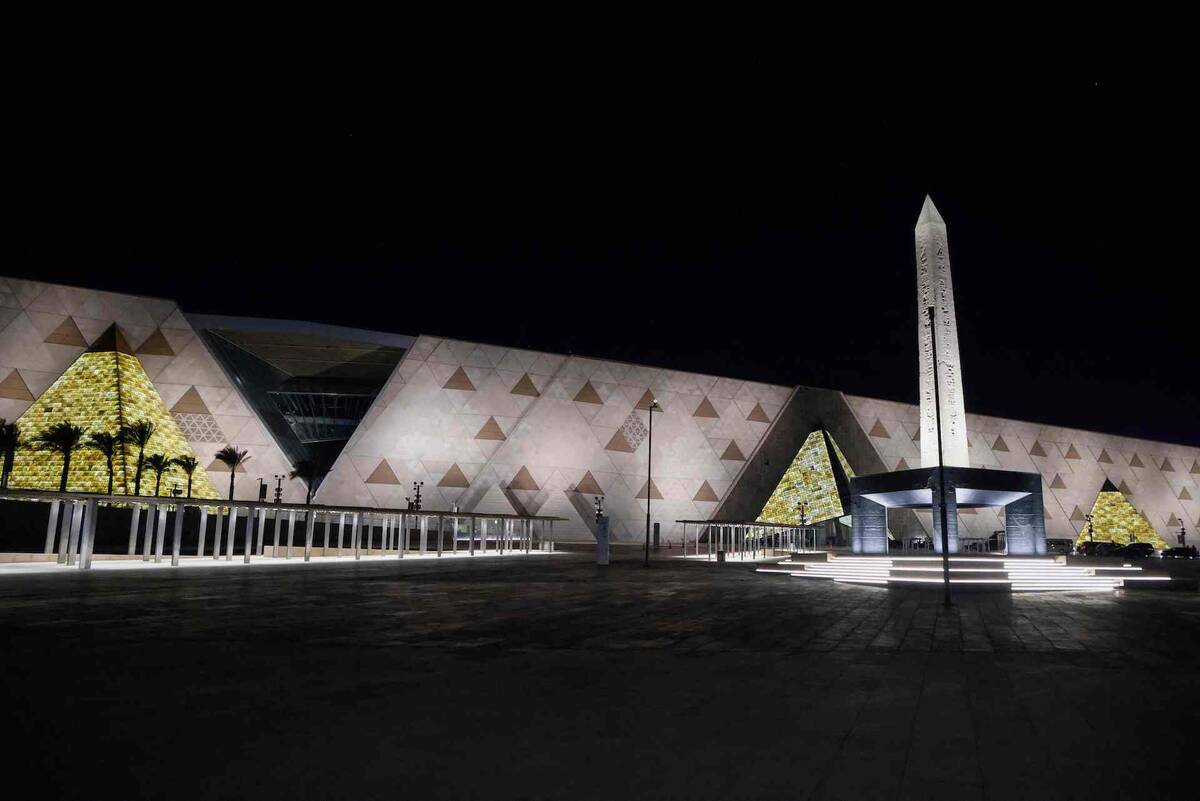LONDON: On March 18, Gaza’s deadliest day since October 2023, Israel shattered the fragile ceasefire that had been in place since late January with a renewed wave of strikes, killing at least 400 people and injuring more than 560 in mere hours, according to local health authorities.
The raids, which Israeli officials claim are intended to pressure the Palestinian militant group Hamas to release its remaining hostages held in Gaza, targeted northern, central, and southern areas, in the wake of a three-week aid embargo during the holy month of Ramadan.
In a statement issued on Telegram, Hamas accused Israel of attacking “defenseless civilians,” adding that fuel shortages, blocked roads, and the worsening humanitarian situation had resulted in many of the wounded succumbing to their injuries before reaching hospitals.
The militant group urged US, Egyptian, and Qatari mediators to hold Israeli Prime Minister Benjamin Netanyahu’s government “fully responsible” for “violating and overturning” the ceasefire.
In a post on X, Israel’s Defense Minister Israel Katz insisted his country was fighting against Hamas and not Gaza’s civilians.

“Most Israelis oppose resuming the war, many at least supporting a continued ceasefire to save the hostages,” Mairav Zonszein, a senior Israel analyst with the International Crisis Group, told Arab News. (AFP/File)
“But when Hamas fights in civilian dress, from civilian homes, and from behind civilians, it puts civilians in danger and they pay a horrible price. That is why we are urging Gazans to evacuate combat zones,” he said.
Analysts and humanitarian agencies have condemned Israel’s renewed assault on Gaza. Amjad Iraqi, an Israel-Palestine expert at the International Crisis Group, told Arab News: “Palestinian civilians in Gaza are being collectively punished.”
“Israel has cut off virtually all aid, electricity, and water to 2.3 million people since early March, and is now relaunching devastating airstrikes and evacuation orders in hopes of either pressuring Hamas into further concessions or inducing Gazans’ forced expulsion,” he said.
“The weaponization of humanitarian aid and basic necessities knowingly threatens the civilian population’s very survival and its ability to recover after a year and a half of a brutal war.”
This assessment was echoed by Philippe Lazzarini, head of the UN Relief and Works Agency, who likewise described the aid ban as “collective punishment” against a population largely composed of “children, women and ordinary men.”
The renewed blockade, in place since March 4, has left residents facing severe food insecurity, with prices for essentials at least tripling, according to residents of Deir Al-Balah in central Gaza.
The closure of all border crossings for humanitarian and commercial supplies has prevented the UN World Food Programme from delivering any supplies into Gaza since early March.
“No food, no medicines, no water, no fuel,” Lazzarini wrote in a post on X on March 23. “Every day without food inches Gaza closer to an acute hunger crisis.”
In October, prior to the ceasefire, the UN warned that 1.84 million people across Gaza were experiencing crisis-level food insecurity, including nearly 133,000 facing catastrophic levels and 664,000 at emergency levels.

Aid workers, hospitals, homes, and schools serving as shelters have all suffered war damage. (AFP/File)
Aid workers, hospitals, homes, and schools serving as shelters have all suffered war damage. Airstrikes and artillery fire have also hit tents housing displaced people, a pattern the UN Human Rights Office, or OHCHR, says it has extensively documented since October 2023.
The Geneva-headquartered Medecins Sans Frontieres said in a statement that its teams were “horrified” by the resumption of air attacks.
On March 21, the MSF announced the death of one of its staff members, Alaa Abd-Elsalam Ali Okal, who was reportedly killed in an Israeli airstrike on his apartment building in Deir Al-Balah.
The organization said it was “shocked and saddened” by the loss, which brings the total number of MSF staff killed since October 2023 to 10.
The US-based MedGlobal also voiced concern for its staff and international volunteers in the Gaza Strip. It said on Sunday night that Israel had bombed Nasser Hospital — one of the last operational facilities where its teams were working — without warning or an evacuation order.
The hospital, located in Khan Younis in southern Gaza, was reportedly hit by an Israeli airstrike, killing at least five people and injuring several others. Among the dead was Hamas political bureau member Ismail Barhoum, who was receiving treatment at the facility.
The attacks “appear to be the prelude to a broader Israeli ground campaign in Gaza, and not just a shock-and-awe tactic to scare Hamas into accepting Israel’s unilateral revision of the agreed ceasefire terms,” Max Rodenbeck, Israel-Palestine project director at the International Crisis Group, told Arab News.

“The weaponization of humanitarian aid and basic necessities knowingly threatens the civilian population’s very survival and its ability to recover after a year and a half of a brutal war,” Amjad Iraqi, an Israel-Palestine expert at the International Crisis Group, told Arab News. (AFP/File)
“The Netanyahu government wants the optics of victory more than it wants to retrieve hostages. The price for this is hundreds more Palestinian civilians killed.”
Indeed, Netanyahu has said the latest airstrikes are “only the beginning,” vowing to continue the offensive until Israel destroys Hamas and frees all hostages held by the militant group.
Prior to March 18, Netanyahu accused Hamas of repeatedly refusing to release the remaining 59 hostages — 24 of whom are thought to be alive — taken on Oct. 7, 2023, during the militant group’s unprecedented attack in southern Israel that triggered the war on Gaza.
However, Hamas has denied rejecting a proposal from US Middle East envoy Steve Witkoff, instead accusing Israel of breaking the truce by reneging on its commitment to enter the second phase of the ceasefire deal.
The militant group said the US “bears full responsibility for the massacres” in Gaza, after the White House confirmed Israel consulted the Donald Trump administration before resuming airstrikes.
Alongside Barhoum, the recent airstrikes have killed several senior Hamas officials, including Gaza’s top political leader and ministers. On Sunday, Hamas confirmed lawmaker Salah Al-Bardawil was killed in an Israeli strike on western Khan Younis in southern Gaza.
Israel’s defense minister, Katz, warned on March 19 that Gaza would face “significantly worse” strikes if the remaining hostages were not released and Hamas was not expelled. Katz also suggested that Palestinians should consider “relocating to other parts of the world.”

Israel’s defense minister, Katz, warned on March 19 that Gaza would face “significantly worse” strikes if the remaining hostages were not released and Hamas was not expelled. (AFP/File)
“The alternative is utter destruction and devastation,” he added.
The Israeli military has already mounted “limited” ground operations in northern Gaza. It said on Saturday that troops had begun operating in the Beit Hanoun area “to target Hamas’ terror infrastructure sites in order to expand the security zone in northern Gaza.”
Katz announced plans to “seize additional areas in Gaza, evacuate the population, and expand security zones around Gaza to protect Israeli communities and soldiers.”
The escalating military campaign has raised concerns about the safety of the hostages.
Hamas has accused Israel of endangering the captives’ lives, a view echoed by the Hostages and Missing Families Forum in Israel. The forum expressed “shock and anger” at what it called “the deliberate disruption” of efforts to return loved ones from Hamas captivity.
This criticism aligns with broader skepticism about Israel’s strategy in Gaza.
Mairav Zonszein, a senior Israel analyst with the International Crisis Group, argued that Israel’s operation in Gaza “will not achieve either of its war goals: to defeat Hamas and to bring the hostages home.”
“Most Israelis oppose resuming the war, many at least supporting a continued ceasefire to save the hostages,” she told Arab News.
“The idea that military strikes will pressure Hamas to release hostages without an end to the war is unrealistic at best, and disingenuous at worst.”
Public frustration with Netanyahu’s decision to resume the war was evident on Saturday night when more than 100,000 Israelis staged protests in Tel Aviv, Jerusalem, and other cities.
“All of this is happening as Netanyahu moves to fire his general security chief amid an investigation into advisers in his office, on top of his ongoing corruption trial and the looming deadline to pass the budget by the end of March,” Zonszein added.

“The Netanyahu government wants the optics of victory more than it wants to retrieve hostages. The price for this is hundreds more Palestinian civilians killed.” (AFP/File)
The greatest toll, however, has fallen on Gazans, who have endured nearly 18 months of violence and displacement.
“Children and families in Gaza have barely caught their breath and are now being plunged back into a horrifically familiar world of harm that they cannot escape,” said Ahmad Alhendawi, Save the Children’s regional director, in a statement on March 18.
“This latest slaughter was on starved, besieged, defenseless families,” he added.
Since Oct. 7, 2023, Israeli airstrikes and ground operations have killed at least 50,000 Palestinians and wounded more than 113,000 others in Gaza, according to the enclave’s health authority.
Some 1.9 million Gazans — 90 percent of the population — have been displaced multiple times. When the fragile ceasefire began in January, hundreds of thousands returned to the rubble of their homes and neighborhoods.
However, the resumption of hostilities has forced war-weary Gazans back into a cycle of displacement, fleeing one danger zone only to be thrust into another.
“There is no resilience,” an aid official in Gaza told The Guardian newspaper. “People … are in a very weak state, physically and psychologically.”
The OHCHR warned that Israel’s continued block of humanitarian aid, Gaza’s catastrophic shelter crisis, and limited access to life-saving services will likely worsen the impact of mass displacement.
Shocked by the resumption of strikes, Gazans have turned to social media to share their stories of renewed upheaval.
“Children’s bodies line morgue refrigerator floors; there’s no more room for the dead,” Anees Ghanima posted. “Has the world really gotten too small to hold us?”
Another Gazan, Khaled Safi, wrote: “The war on Gaza has returned while they are fasting, hungry, asleep, and haunted by death at every moment.”

Children sit on a couch amid the destruction following an Israeli strike in the Nuseirat refugee camp in the central Gaza Strip. (AFP/File)
With the situation deteriorating, a return to diplomatic solutions seems more urgent than ever.
“The parameters of the January ceasefire must be restored and linked to the Arab League’s ‘day after’ framework presented on March 4,” Iraqi of the International Crisis Group said.
“This framework is the only basis for a meaningful way to save Palestinian lives, return the hostages, tame Hamas under national and regional oversight, and restore a measure of stability.
“Diplomacy and leverage from Arab states — particularly vis-a-vis the US as the main actor to influence and press Israel — will be critical in determining whether this can be achieved.”





























